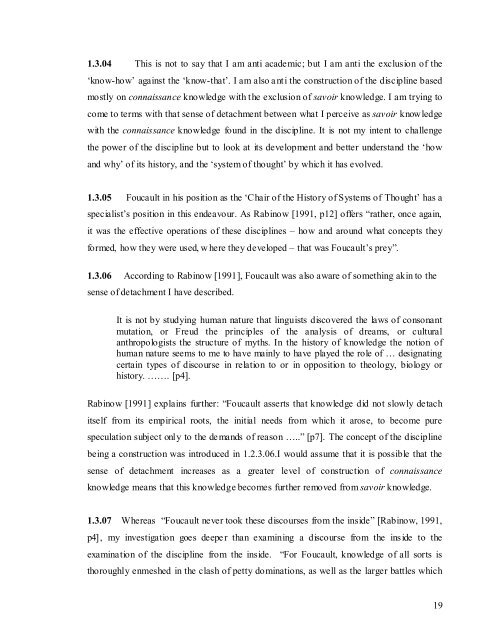Mapping the aliran of the academic discipline of entrepreneurship: A ...
Mapping the aliran of the academic discipline of entrepreneurship: A ...
Mapping the aliran of the academic discipline of entrepreneurship: A ...
You also want an ePaper? Increase the reach of your titles
YUMPU automatically turns print PDFs into web optimized ePapers that Google loves.
1.3.04 This is not to say that I am anti <strong>academic</strong>; but I am anti <strong>the</strong> exclusion <strong>of</strong> <strong>the</strong><br />
‘know-how’ against <strong>the</strong> ‘know-that’. I am also a nt i <strong>the</strong> construction <strong>of</strong> <strong>the</strong> <strong>discipline</strong> based<br />
mostly on connaissance knowledge with t he exclusion <strong>of</strong> savoir knowledge. I am trying to<br />
come to terms with that sense <strong>of</strong> detachment between what I perceive as savoir knowledge<br />
with <strong>the</strong> connaissance knowledge found in <strong>the</strong> <strong>discipline</strong>. It is not my intent to challenge<br />
<strong>the</strong> power <strong>of</strong> <strong>the</strong> <strong>discipline</strong> but to look at its development and better understand <strong>the</strong> ‘how<br />
and why’ <strong>of</strong> its history, and <strong>the</strong> ‘system <strong>of</strong> thought’ by which it has evolved.<br />
1.3.05 Foucault in his position as <strong>the</strong> ‘Chair <strong>of</strong> <strong>the</strong> History <strong>of</strong> Systems <strong>of</strong> Thought’ has a<br />
specialist’s position in this endeavour. As Rabinow [1991, p12] <strong>of</strong>fers “ra<strong>the</strong>r, once again,<br />
it was <strong>the</strong> effective operations <strong>of</strong> <strong>the</strong>se <strong>discipline</strong>s – how and around what concepts <strong>the</strong>y<br />
formed, how <strong>the</strong>y were used, w here <strong>the</strong>y developed – that was Foucault’s prey”.<br />
1.3.06 According to Rabinow [1991], Foucault was also aware <strong>of</strong> something akin to <strong>the</strong><br />
sense <strong>of</strong> detachment I have described.<br />
It is not by studying human nature that linguists discovered <strong>the</strong> laws <strong>of</strong> consonant<br />
mutation, or Freud <strong>the</strong> principles <strong>of</strong> <strong>the</strong> analysis <strong>of</strong> dreams, or cultural<br />
anthropologists <strong>the</strong> structure <strong>of</strong> myths. In <strong>the</strong> history <strong>of</strong> knowledge <strong>the</strong> notion <strong>of</strong><br />
human nature seems to me to have mainly to have played <strong>the</strong> role <strong>of</strong> … designating<br />
certain types <strong>of</strong> discourse in relation to or in opposition to <strong>the</strong>ology, biology or<br />
history. ……. [p4].<br />
Rabinow [1991] explains fur<strong>the</strong>r: “Foucault asserts that knowledge did not slowly detach<br />
itself from its empirical roots, <strong>the</strong> initial needs from which it arose, to become pure<br />
speculation subject onl y to <strong>the</strong> de mands <strong>of</strong> reason …..” [p7]. The concept <strong>of</strong> <strong>the</strong> <strong>discipline</strong><br />
being a construction was introduced in 1.2.3.06.I would assume that it is possible that <strong>the</strong><br />
sense <strong>of</strong> detachment increases as a greater level <strong>of</strong> construction <strong>of</strong> connaissance<br />
knowledge means that this knowledge becomes fur<strong>the</strong>r removed from savoir knowledge.<br />
1.3.07 Whereas “Foucault never took <strong>the</strong>se discourses from <strong>the</strong> inside” [Rabinow, 1991,<br />
p4] , my investigation goes deepe r than examining a discourse from <strong>the</strong> ins ide to <strong>the</strong><br />
examination <strong>of</strong> <strong>the</strong> <strong>discipline</strong> from <strong>the</strong> inside. “For Foucault, knowledge <strong>of</strong> all sorts is<br />
thoroughly enmeshed in <strong>the</strong> clash <strong>of</strong> petty dominations, as well as <strong>the</strong> larger battles which<br />
19

















